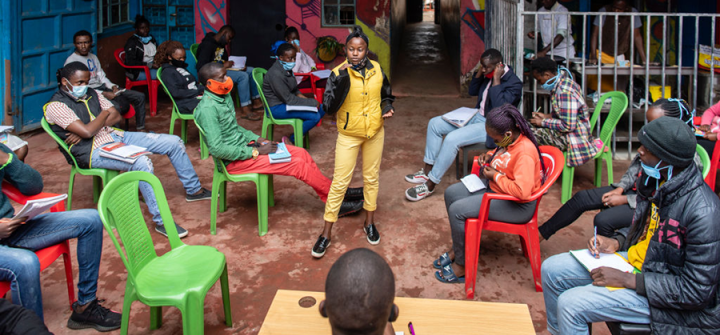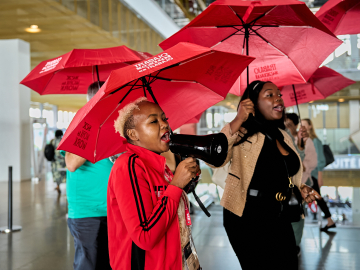Surprising Data on Contraception Needs & Use During COVID-19
Evidence from past health emergencies sparked fears that COVID-19 would disrupt access to contraception, especially for women and girls in sub-Saharan Africa—but data collected in 4 countries yielded had some surprising findings.
The barriers the pandemic poses to reproductive health services are real—including restrictions on movement, facility closures, job loss and school closures. All were projected to affect women’s health-seeking behaviors, including contraceptive use—and potentially increase the risk of unintended pregnancy.
But data from the Performance Monitoring for Action study, published recently in The Lancet Global Health, indicate this is not necessarily the case. We collected data in 4 geographies—2 at the country-level (Burkina Faso and Kenya) and 2 at the subnational-level (Kinshasa, Democratic Republic of the Congo, and Lagos, Nigeria)—during COVID-19, reaching out to 7,245 women with phone-based surveys from May to July 2020. Our team compared reproductive health outcomes measured during the pandemic to those immediately preceding COVID-19 to examine how women's need for, and use of, contraception changed.
Contrary to our initial hypothesis, we found that the proportion of women in need of contraception increased significantly in only one context. In Lagos, Nigeria, the number of women in need—that is, women who are married or living with a partner, sexually active, and want to avoid pregnancy in the next year—rose by about 6% from the beginning of the pandemic. Contraceptive use among women in need also rose unexpectantly among women in Kenya and rural areas of Burkina Faso. Although many places had been seeing increases pre-COVID, we also hypothesize that women may be choosing to delay pregnancy in times of uncertainty. No significant changes in contraceptive use were observed in urban areas of Kinshasa or Lagos.
Despite these early findings, we caution against assumptions that women are protected from future risk of unintended pregnancy, as the patterns observed may not be sustainable throughout prolonged economic hardship and service disruptions. Results from our surveys in Lagos and Kinshasa highlight important trends that should be followed closely by policymakers, researchers, and service providers over the course of the pandemic.
For example, younger women may be falling through the cracks amid disruptions to service channels. Funmilola OlaOlorun, PhD, MPH, MBBS a co-author of the study and PMA’s co-principal investigator in Nigeria with the University of Ibadan, underscores the relevance of the significant increase we observed in women’s need for contraception and decrease in contraceptive use of 24% among younger women in Lagos: “These findings provide evidence for a potential increase in unintended pregnancies among younger, sexually active women in Lagos. While we only examined these changes among women who were married or in-union, unmarried, sexually active adolescent girls may face additional burdens accessing and using contraception during the pandemic, requiring further research and attention.”
The impact of income loss is another threat, highlighted by Pierre Akilimali, MD, PhD, MPH, the principal investigator at PMA’s partner in DRC, the Kinshasa School of Public Health. Nearly 70% of women in Kinshasa indicated complete COVID income loss related to COVID-19. The pandemic has exacerbated the economic dependence of women on their partners, he notes, thus making women less autonomous in their reproductive decisions: “Earlier PMA results showed that women with a higher contraceptive autonomy were more likely to use contraception; thus, contraceptive autonomy should also continue to be monitored in light of the COVID-19 pandemic, given its potential impact on unintended pregnancy.”
The pandemic is far from behind us, and the economic and social impacts have yet to unfold. As longer-term financial concerns grow and spiking cases spur further lockdowns and restrictions, the challenge of ensuring facility- and community-based reproductive health services are available across sub-Saharan Africa won’t disappear. Continued monitoring efforts are needed to safeguard women’s access to contraceptive services and ability to achieve their reproductive goals.
Learn more about the results of this study here.
Shannon N. Wood, PhD, MSc is an assistant scientist in the Department of Population, Family and Reproductive Health at the Johns Hopkins Bloomberg School of Public Health, where her research focuses on social determinants of women’s health.
Funmilola M. OlaOlorun, PhD, MPH, MBBS is a Nigerian-trained community health physician who is passionate about the health of women across the life course. She has been a co-principal investigator with the PMA/Nigeria team since 2014.
Pierre Akilimali, MD, PhD, MPH, is an Associate Professor of Medicine and Public Health at the Kinshasa School of Medicine and the Kinshasa School of Public Health, University of Kinshasa. He is the principal investigator for the PMA/DRC team.
Celia Karp, PhD is an assistant scientist in the Department of Population, Family and Reproductive Health at the Johns Hopkins Bloomberg School of Public Health, where her research explores factors shaping women’s and girls’ reproductive health
Join the 50,000+ subscribers in 170+ countries who rely on Global Health NOW summaries and exclusive articles for the latest public health news. Sign up for our free weekday newsletter, and please share the link with friends and colleagues: https://www.globalhealthnow.org/subscribe
A teen girl presents her case at a debate on contraception at the Billian Music Family Resource & Leadership Centre in Mathare Informal Settlement on July 10, 2020 in Nairobi, Kenya. Image: Alissa Everett/Getty




